ECLAC Calls the Region’s Countries to Build a Shared Vision on Governance of Natural Resources and Infrastructure
Work area(s)
The organization’s Executive Secretary, Alicia Bárcena, inaugurated a high-level regional dialogue with the presence of ministers and deputy ministers from 21 countries.
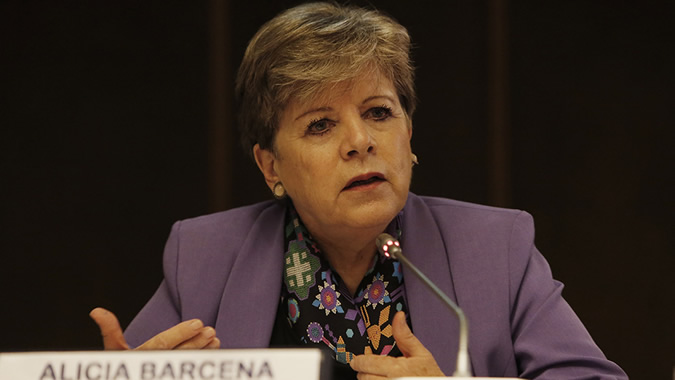
The Economic Commission for Latin America and the Caribbean (ECLAC) called on the region’s countries to build a shared vision on governance of natural resources and infrastructure with an integrated and sustainable approach, in order to make progress on closing the significant gaps that still persist in these areas. This call was made at a high-level event held today at ECLAC’s headquarters in Santiago, Chile.
The Executive Secretary of the regional United Nations body, Alicia Bárcena, was the main speaker at the High-level Regional Dialogue on the Governance of Natural Resources and Infrastructure, which was attended by nearly 15 ministers and also deputy ministers of energy, mining, infrastructure, the environment and natural resources from 21 Latin American and Caribbean countries. This event marked the formal inauguration of the Governance Week on Natural Resources and Infrastructure, which is taking place at ECLAC through Friday, November 11.
“The governance of natural resources is a key element today in the development agenda of Latin America and the Caribbean since it involves reflecting upon property ownership, the means of appropriation and the distribution of the productivity earnings that they generate,” Bárcena said. “I invite you to forge a shared vision on this issue, which creates a new balance between the State, the private sector and society, and renewed opportunities for dialogue, participation, planning and transparency,” she added.
In her presentation, the Executive Secretary of ECLAC explained that it is fundamental to increase current low levels of investment in infrastructure (2.2% of annual GDP on average), a figure that is insufficient to cover countries’ needs in this area (which are projected at between 5.4% and 8.6% of GDP, depending on the economic growth scenario).
“The governance of natural resources and infrastructure requires a paradigm shift and new coalitions. It is about changing the conversation to achieve better agreements between companies, communities and society as a whole. It demands a long-term vision to move towards a sustainable future, with greater social inclusion and intergenerational equality,” Alicia Bárcena indicated.
According to the senior United Nations official, the progressive structural change that the region needs in order to shift its development paradigm cannot be achieved without transforming the current pattern for the design and use of infrastructure for transportation, energy, water and telecommunications. “We must change our production matrix because it is the reflection of the inequality seen in our region,” she emphasized.
Bárcena said that ECLAC’s proposal to countries in this area includes a research program that facilitates the substantive discussion, the creation and implementation of public policy instruments that incorporate the State’s strategic and political vision on this matter, as well as actions for technical assistance, the institutionalization and systematic execution of mechanisms that facilitate regional dialogue between different actors, and the transmission of this dialogue’s conclusions to the Forum of the Countries of Latin America and the Caribbean, which will hold its first session in Mexico in April 2017.
The High-level Regional Dialogue on the Governance of Natural Resources and Infrastructure included speeches by the heads of delegation of all the countries attending, who shared reflections and experiences regarding the challenges of governance of natural resources and infrastructure in their respective nations.
The Governance Week on Natural Resources and Infrastructure will continue on Tuesday, November 8 with two high-level political dialogues on energy, extractive resources and infrastructure, and will also include a meeting of transportation ministers from Mesoamerica, a gathering on logistics and energy efficiency, and ten other side events, some of which are closed to the public and the details of which can be found on ECLAC’s website.
Related content
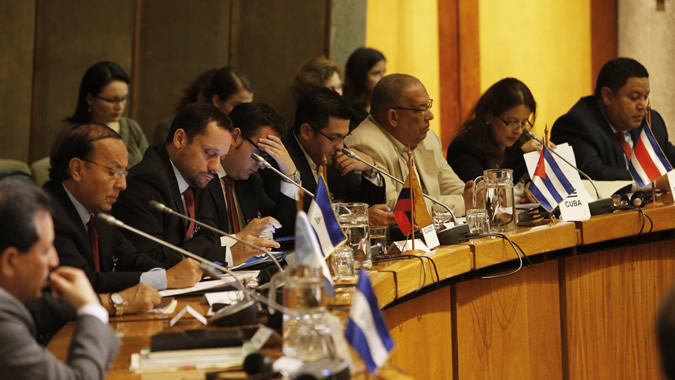
Ministros debaten en CEPAL sobre eficiencia energética y gobernanza de la industria extractiva y de la infraestructura
Autoridades y expertos participaron en diálogos políticos de alto nivel en el marco de la Semana de la Gobernanza de los Recursos Naturales y la Infraestructura que se realiza en Santiago, Chile.

Semana de la gobernanza de los recursos naturales y de la infraestructura
Presentación de Alicia Bárcena, Secretaria Ejecutiva de la CEPAL.
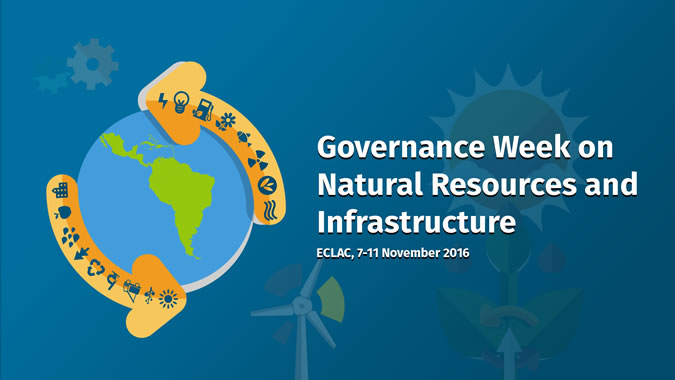
ECLAC to Hold Governance Week on Natural Resources and Infrastructure
From 7 to 11 November, authorities, business leaders and international experts will gather in Santiago, Chile, at a series of meetings to discuss the sustainable use of natural resources and…
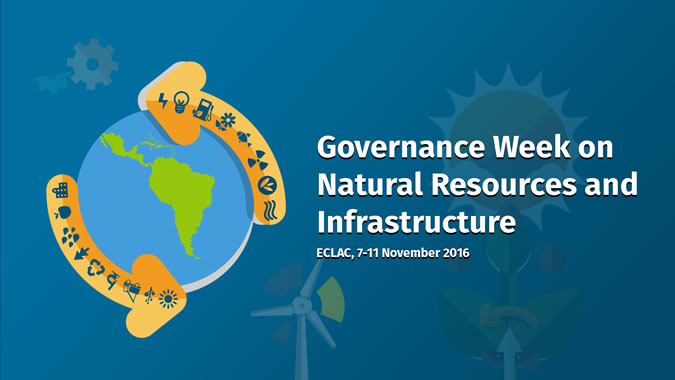
Governance Week on Natural Resources and Infrastructure
The Governance Week on Natural Resources and Infrastructure will take place between November 7th and 11th 2016 at ECLAC headquarters in Santiago, Chile. Government representatives from the areas of…
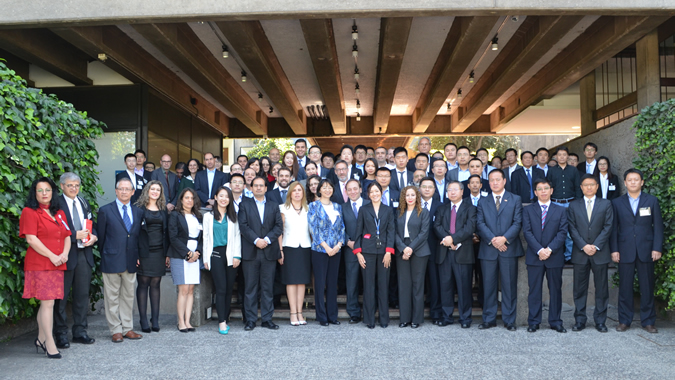
Destacan gran potencial de inversiones chinas en el sector de infraestructura de América Latina y el Caribe
Autoridades, expertos y empresarios debatieron en la CEPAL sobre el rol de las asociaciones público-privadas para cerrar la brecha de inversión en esta área.
Country(ies)
- Latin America and the Caribbean
